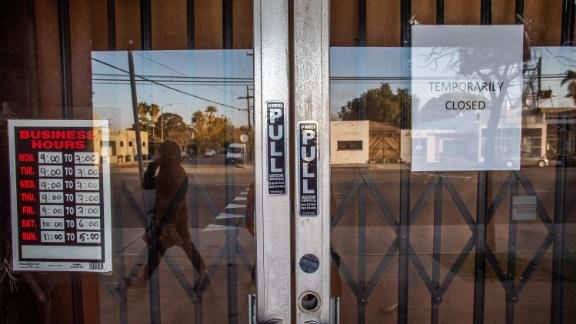60 million Europeans could suffer furloughs, layoffs or wage cuts

Nearly 60 million jobs across the European Union and the United Kingdom are at risk from the coronavirus pandemic, according to McKinsey.
The consulting firm warns in a report published Monday that the EU unemployment rate could soar from around 6% to more than 11% and remain elevated for years if the disease is not quickly contained.
McKinsey estimates that one in four jobs across the European Union and the United Kingdom are at risk of a reduction in hours or pay, temporary furloughs or permanent layoffs. Professions that do not require close contact with others, including accountants and architects, are considered low risk, along with those that provide essential services such as police.
Some 55 million workers are employed in high risk professions, including retail cashiers, cooks, construction workers, hotel staff and actors. Roughly 80% of jobs considered at risk are held by people who do not have a college degree, with employees of smaller companies in particular danger.
Under a scenario in which Europe fails to contain the virus within three months and is forced to continue social distancing measures through the summer, the EU unemployment rate will peak at 11.2% in 2021, with a full recovery unlikely until 2024.
McKinsey said that business and governments need to move quickly to safeguard jobs. Companies should cut costs, separate work shifts and enable remote working where possible. Governments should provide loan guarantees, tax relief and guarantee pay for workers, some of which is already being done across Europe.
The United Kingdom is covering 80% of worker salaries for at least the next three months up to a maximum of £2,500 ($2,900) a month. Germany and France have similar programs in place. The European Union’s coronavirus relief package includes up to €100 billion ($110 billion) in wage subsidies aimed at preventing mass layoffs, as well as hundreds of billions in loans to businesses and credit for EU governments.
“Safeguarding jobs at risk in otherwise healthy, productive enterprises is imperative; losing those jobs would not only be a tragedy on an individual level, but would also be very painful from an economic perspective,” said the McKinsey report.
The US labor market is already getting slammed by the pandemic, with around 22 million people, or roughly 13.5% of the labor force, filing initial jobless claims since March 14. The country’s unemployment rate, which climbed to 4.4% in March, from a historic low of 3.5% in February, is expected to hit double-digits in April.
Many economists expect US unemployment to eventually hit 15% or more. JPMorgan’s economists are forecasting a peak as high as 20%.
Employment in the United States fell faster and deeper during the 2008 global financial crisis than in Europe, noted McKinsey, most likely because labor market regulations are more flexible in America. The US labor market, however, bounced back much more quickly, with employment returning to pre-crisis levels by the end of 2014. It took Europe another two years to do the same.
